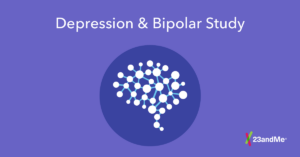In collaboration with The Milken Institute and Lundbeck, 23andMe is launching a groundbreaking new study leveraging 23andMe’s unique research model to look at the  genetics underlying depression and bipolar disorder.
genetics underlying depression and bipolar disorder.
In the United States alone, depression and bipolar disorders impact more than 16 million people, and fewer than half ever receive effective treatment. According to the World Health Organization, depression alone accounts for the most ‘years lost’ in disability than any other health condition worldwide.
Although scientists have spent decades studying the conditions, our understanding of the underlying biology remains rudimentary. Recent studies have offered some intriguing clues for future inquiry, but there’s still so much left to discover. This study will combine genetic information with cognitive assessments and behavioral data that researchers hope will glean new insights that could inform new treatments.
“We need a wider, more varied data set to make additional discoveries,” said Emily Drabant Conley, PhD., vice president of Business Development at 23andMe. “By studying intermediate phenotypes such as cognitive function alongside genetics and other environmental variables on a massive scale, we hope to take a significant step forward in the study of depression and bipolar.”
The goal is to enroll 15,000 people with depression and 10,000 individuals with bipolar disorder and then incorporate their data to assess better how genes influence brain processes such as attention, decision-making and visual perception.
It’s a unique approach that leverages 23andMe’s research model, which can rapidly gather vast amounts of genetic, cognitive and behavioral data for the study.
Already considered a pioneer in genetic research, 23andMe has successfully established research communities to study Parkinson’s disease, lupus, IBD, and fertility, adding to the more than 75 studies the company has already published in scientific journals to date. Additionally, this research builds on the largest study of its kind on the genetics of major depressive disorder conducted by 23andMe.
Last summer 23andMe, along with Massachusetts General Hospital and Pfizer, published findings in what was by far the largest study of its kind focused on major depressive disorder. In that study, researchers identified 15 new genetic regions linked to depression. The study was instructive not just in what it found, but in how it drew on the massive amount of data from 23andMe customers who had consented to research.
And that is the hope here – that 23andMe’s unique research model, and its ability to quickly recruit individuals with depression and bipolar disorder will help lead to new breakthroughs in research into these conditions.
Go here to find out more about this study.




